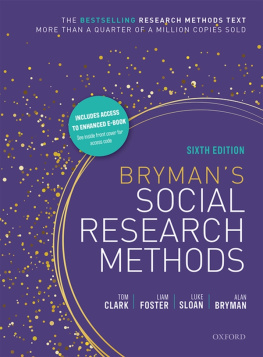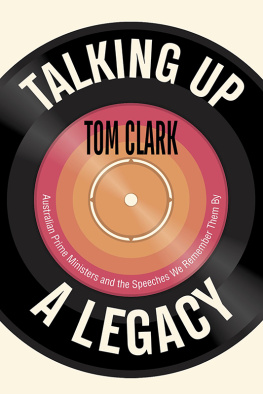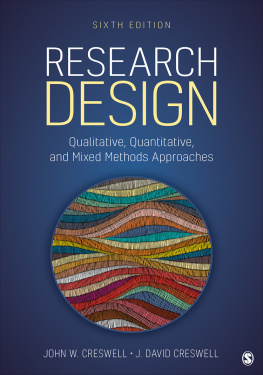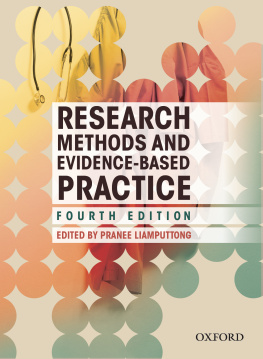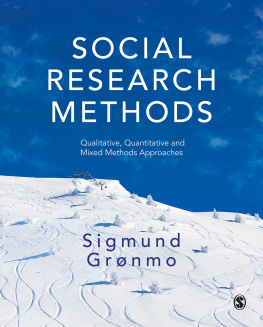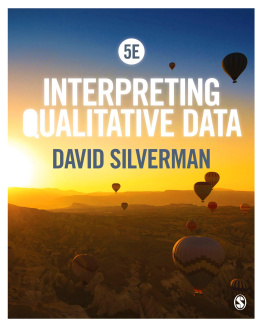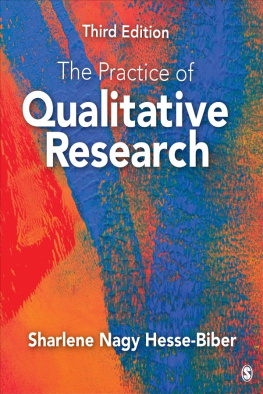Tom Clark - Brymans Social Research Methods
Here you can read online Tom Clark - Brymans Social Research Methods full text of the book (entire story) in english for free. Download pdf and epub, get meaning, cover and reviews about this ebook. City: Oxford, year: 2021, publisher: Oxford University Press, genre: Science. Description of the work, (preface) as well as reviews are available. Best literature library LitArk.com created for fans of good reading and offers a wide selection of genres:
Romance novel
Science fiction
Adventure
Detective
Science
History
Home and family
Prose
Art
Politics
Computer
Non-fiction
Religion
Business
Children
Humor
Choose a favorite category and find really read worthwhile books. Enjoy immersion in the world of imagination, feel the emotions of the characters or learn something new for yourself, make an fascinating discovery.
- Book:Brymans Social Research Methods
- Author:
- Publisher:Oxford University Press
- Genre:
- Year:2021
- City:Oxford
- Rating:4 / 5
- Favourites:Add to favourites
- Your mark:
Brymans Social Research Methods: summary, description and annotation
We offer to read an annotation, description, summary or preface (depends on what the author of the book "Brymans Social Research Methods" wrote himself). If you haven't found the necessary information about the book — write in the comments, we will try to find it.
offers unrivalled coverage of the whole research process.
The authors have worked closely with lecturers and students in thoroughly updating the sixth edition to reflect the current social science landscape, and carefully streamlining content to make it relevant and appealing to todays students. As a result, the texts comprehensive coverage - which
includes many new examples and additional material on areas such as social media research and big data - is now even clearer, more focused, and easier to navigate.
In addition to many new examples of published research, this edition features the insights of a panel of recent graduates from their experiences of researching a variety of fascinating topics, including attitudes towards the LGBT+ community on social media, the experiences of Pakistani Muslim single
mothers, and the impact of screen time on sleep. Learn from experience boxes in every chapter contain their candid reflections on the successes and challenges of their projects, and their advice for student researchers.
Digital formats and resources
Brymans Social Research Methods is available for students and institutions to purchase in a variety of formats, and is supported by extensive online resources.
The e-book offers a mobile experience and convenient access, with learning resources embedded and hyperlinked throughout to offer self-assessment activities and extra support: www.oxfordtextbooks.co.uk/ebooks
The student resources, accessible both online and via the e-book, include:
- Over 300 multiple choice questions
- A Research process in practice simulation
- Student researchers toolkit
- Answers to the end-of-chapter questions, including audio commentary from the authors
- A flashcard glossary
- Data analysis software tutorials covering SPSS, Nvivo, R, and Stata
- Guidance on using Excel in data analysis
- Learn from experience videos, expanding on the graduate insights provided in the book
The books teaching resources, accessible online to adopting lecturers, include:
- PowerPoint slides for every chapter
- 250 test bank questions
- 25 seminar outlines
- 75 exam- or coursework-based questions
- Figures and tables from the book
Tom Clark: author's other books
Who wrote Brymans Social Research Methods? Find out the surname, the name of the author of the book and a list of all author's works by series.

